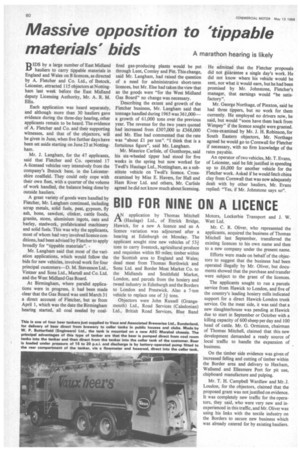Massive opposition to lippable
Page 62

If you've noticed an error in this article please click here to report it so we can fix it.
materials' bids A marathon hearing is likely no IDS by a large number of East Midland
hauliers to carry tippable materials in England and Wales on B licences, as directed by A. Fletcher and Co. Ltd., of Ibstock, Leicester, attracted 115 objectors at Nottingham last week before the East Midland deputy Licensing Authority, Mr. A. R. M. Ellis.
Each application was heard separately, and although more than 30 hauliers gave evidence during the three-day hearing, other applicants remain to be heard. The evidence of A. Fletcher and Co. and their supporting witnesses, and that of the objectors, will be given in June, when five further days have been set aside starting on June 23 at Nottingham.
Mr. J. Langham, for the 47 applicants, said that Fletcher and Co. operated 17 A-licensed vehicles very intensively from the company's lbstock base, in the Leicestershire coalfield. They could only cope with their own fleet, with a quarter of the volume of work handled, the balance being done by outside hauliers.
A great variety of goods were handled by Fletcher, Mr. Langham continued, including scrap metals, solid fuels, peat. gypsum, fly ash, bone, sawdust, clinker, cattle foods, granite, stone, aluminium ingots, oats and barley, steelwork, prefabricated machinery and solid fuels. This was why the applicants, most of whom had very involved licence conditions, had been advised by Fletcher to apply broadly for "tippable materials".
Mr. Langham said that most of the variation applications, which would follow the bids for new vehicles, involved work for four principal customers—D. M. Stevenson Ltd., Vintner and Sons Ltd., Martell and Co. Ltd. and the West Midland Gas Board.
At Birmingham, where parallel applications were in progress, it had been made clear that the Gas Board was until March 31 a direct account of Fletcher, but as from April 1, which was the date the Birmingham hearing started, all coal needed by coal
tired gas-producing plants would be put through Lunt, Comley and Pitt. This change, said Mr. Langham, had raised the question of a need for administrative short-term licences, but Mr. Else had taken the view that as the goods were "for the West Midland Gas Board" no change was necessary.
Describing the extent and growth of the Fletcher business, Mr. Langham said that tonnage handled during 1965 was 361,000a growth of 61,000 tons over the previous year. The revenue for the two years quoted had increased from £307,000 to £368,000 and Mr. Else had commented that the rate was "about £1 per ton". "I think that is a fortuitous figure", said Mr. Langham.
Mr. Maurice Carlisle, of Gunthorpe, said his six-wheeled tipper had stood for five weeks in the spring but now worked for Twell's Haulage Ltd., Nottingham, as a substitute vehicle on Twell's licence. Crossexamined by Miss E. Havers, for Hall and Ham River Ltd. and others, Mr. Carlisle agreed he did not know much about licensing. He admitted that the Fletcher proposals did not guarantee a single day's work. He did not know where his vehicle would be sent, nor what it would earn, but he had been promised by Mr. Johnstone, Fletcher's manager, that earnings would "be satisfactory".
Mr. George Northage, of Pinxton, said he had three tippers, but no work for them currently. He employed no drivers now, he said, but would "soon have them back from Wimpey" if the licence sought were granted. Cross-examined by Mr. J. H. Robinson, for South Eastern objectors, Mr. Northage agreed he would go to Cornwall for Fletcher if necessary, with no firm knowledge of the rates payable.
An operator of two vehicles, Mr. T. Evans, of Leicester, said he felt justified in spending up to £6,000 for another vehicle for the Fletcher work. Asked if he would fetch china clay from Cornwall that was now adequately dealt with by other hauliers, Mr. Evans replied: "Yes, if Mr. Johnstone says so".




















































































































































